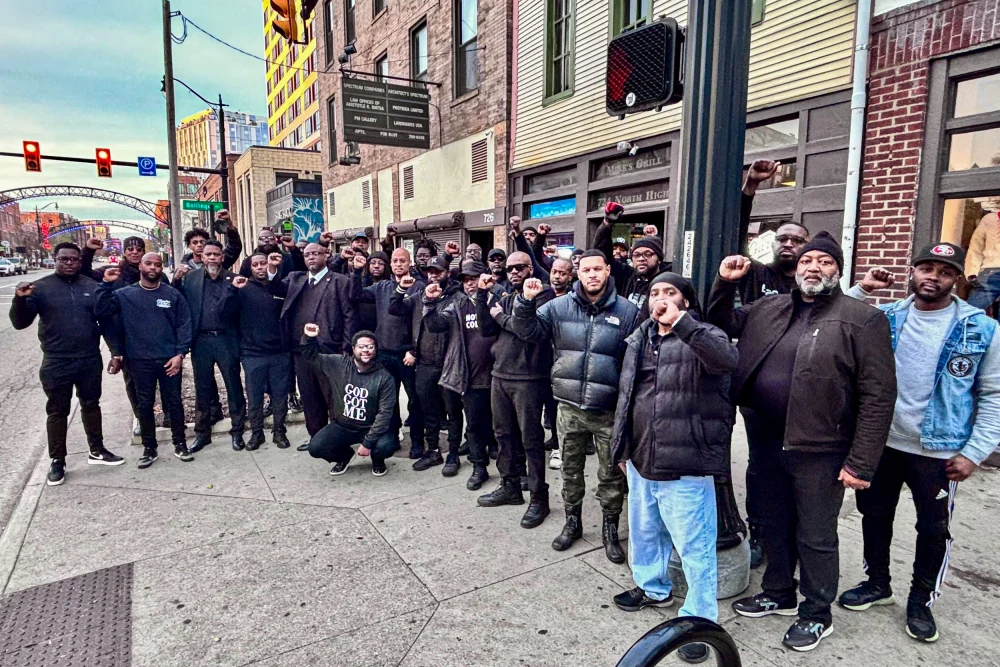A group of Black leaders and locals marched through Columbus, Ohio, in a unity rally Sunday, one day after neo-Nazis walked through the same streets carrying Nazi flags and chanting racial slurs and white nationalist slogans.
The Rev. Derrick Holmes, senior pastor at Columbus’ Union Grove Baptist Church, said he received frantic calls from members of his congregation as people walked along North High Street dressed in all black with red masks, carrying black flags with swastikas on them. They yelled, “Bow down, [N-word]!” and other racist chants as they made their way through the state capital’s Short North Arts District.
“Two members were actually in the Short North area while that was happening and their prevailing feeling was fear,” Holmes said. “There was a feeling of sadness. They’re older … so it really harkened them back to a time they thought that the country had graduated from.”
President Joe Biden condemned the march, and White House spokesperson Andrew Bates said Nazism is “hostile to everything the United States stands for.” Ohio Gov. Mike DeWine, Columbus Mayor Andrew Ginther and other city leaders condemned the neo-Nazis in statements and on social media.
But Black locals like Holmes wanted to do more and send a message of solidarity, they said. The 100 Black Men of Central Ohio, a service organization that mentors young Black men, along with attorney Sean Walton Jr., Holmes and other locals, joined for the counter-rally Sunday afternoon.
Dozens of men walked, many side by side, down North High Street, many dressed in all black. They were largely silent, sharing handshakes and smiles among one another. Brian Winston, president of 100 Black Men of Central Ohio, and Walton led the group, and they all posed together for photos with raised fists at the end of the march.
“It was basically just bringing Black men together, to be able to allow our Black women, children and anyone else who were fearful or scared of what they saw … just to be able to redirect them with unity and love,” Winston said, noting that he called on Walton to help organize the event.
Walton said he was in Houston over the weekend and rushed home to check on his wife and children when he learned of the neo-Nazi march. He said the atmosphere among Black Columbus residents was one of fear and anxiety, with many wondering if they were safe in the city. But Sunday’s march helped ease some of the despair, he said.
“I think there was a lot of focus on the fear,” Walton said. “What we did Sunday changed the tone of the entire weekend. If anything, this has made us stronger. I think it was a test, in a sense, when it comes to whether we can come together in the face of threats to our civil rights, our human rights and our way of life.”
Holmes, Winston and Walton said the outcome of the presidential election and Donald Trump’s rhetoric have encouraged neo-Nazi behavior. Earlier this month, protesters waved Nazi flags outside a community production of “The Diary of Anne Frank” in Michigan, to the shock of performers and theatergoers.
Far-right groups have made headlines in Ohio in recent months. A white nationalist activist in Springfield took credit for the false story that Haitian immigrants in the city were stealing and eating pets, which Trump repeated during the presidential debate and campaign rallies. Police said there was no evidence for the claim.
Right-wing extremism has increased dramatically since 2016, according to research that has linked Trump’s rhetoric about racial and ethnic minorities to vigilantism, hate crimes, and more. After the election, white nationalists, Proud Boys, Christian supremacists, and right-wing conspiracy theorists praised Trump’s win and said they saw it as a victory for their far-right visions of America, according to the Washington Post. In 2017, Trump said there were “very fine people on both sides” after a white supremacist rally in Charlottesville, Virginia, which led to the death of a counterprotester.
Trump has dismissed accusations that he has encouraged extremism or that his supporters include Nazi and fascists. “President Trump is backed by Latinos, Black voters, union workers, angel moms, law enforcement officers, border patrol agents, and Americans of all faiths,” his campaign press secretary, Karoline Leavitt, said in a statement last month.
Oren Segal, vice president of the Anti-Defamation League Center on Extremism, told The New York Times that a St. Louis-based group called Hate Club took credit for the Columbus march.
Jon Lewis, a research fellow at George Washington University’s Program on Extremism, said in an interview that these groups may have different names, but share white nationalist ideologies.
“I think ‘emboldening’ is the perfect way to describe it,” Lewis said. “Neo-Nazis and white supremacists increasingly feel as though they can act with impunity, that they can mobilize to the streets of towns and cities across the country to incite hatred, to spread fear among primarily nonwhite communities.
“At the end of the day, this is about fearmongering and hate-mongering. These groups are designed to make the average nonwhite American feel unsafe in their everyday lives.”

